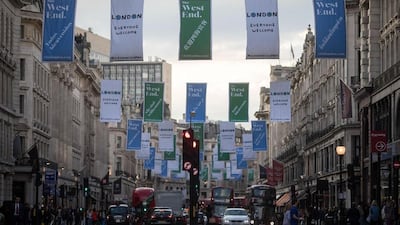The British economy unexpectedly picked up some speed at the end of 2017, despite continued Brexit uncertainty, official data showed on Friday.
The Office for National Statistics said that the economy grew by 0.5 per cent in the fourth quarter of the year, compared with the previous three-month period.
That was faster than the average forecast of 0.4 per cent, and a pickup from 0.4 per cent in the third quarter.
However, the buoyant performance, propelled by the powerhouse services sector, was not enough to prevent the weakest annual growth for five years.
In 2017 as a whole, British economic growth stood at 1.8 per cent, down slightly from the previous year's 1.9 per cent.
That was better than many forecasters had predicted at the time of the Brexit referendum but the slowest since 2012.
"The overall picture is one of muddling through," said Hargreaves Lansdown economist Ben Brettell.
"Growth still looks lacklustre and somewhat unevenly distributed... but it's certainly fair to say the economy has performed much better than many feared in the aftermath of the Brexit vote, boosted by the rising tide of a global recovery which has lifted all boats."
_______________
Read more:
'Brexit squeeze' on consumers to continue in 2018
Shape of post-Brexit Britain to become clearer in 2018
Foreign exchange rates react to Mnuchin, Hammond comments on dollar, pound
_______________
Many experts had predicted economic chaos in the event of a Brexit vote in the nation's 2016 referendum, but this has so far failed to materialise.
Britons narrowly voted to leave the European Union, with departure scheduled for March 2019. There are questions over what access the UK will retain to the bloc, its biggest trade partner. The sides could agree on a transition deal to make the shift easier, particularly for the services sector. Amid the uncertainty, consumer spending and some investment have weakened.
Sterling, already up about 0.7 per cent before the data release on Friday, rose further for a one per cent rise on the day at $1.4289 before giving up some of those gains.
The ONS added on Friday that the GDP expansion was primarily driven by the services sector, which accounts for almost 80 per cent of economic activity.
But it also cautioned over patchy growth.
"Despite a slight uptick in the latest quarter, the underlying picture is of slower and uneven growth across the economy," said ONS head of GDP Darren Morgan.
"The boost to the economy at the end of the year came from a range of services including recruitment agencies, letting agents and office management.
"Other services - notably consumer facing sectors - showed much slower growth.
"Manufacturing also grew strongly but construction again fell," Mr Morgan added.

